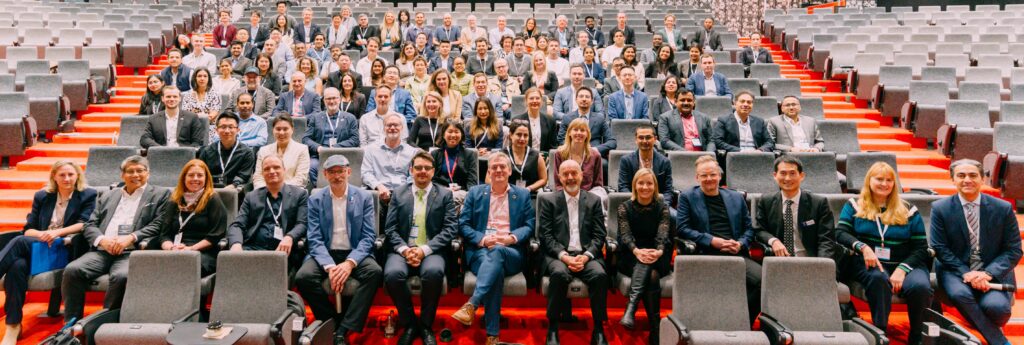Event date: November 18, 2024
This past week, the University of Melbourne proudly hosted the Decarbonising the Building Industry (DBI) 2024 Conference, a two-day event that brought together over 200 attendees from 18 countries. With the theme Net-Zero Whole-Life Carbon Buildings by 2050, DBI 2024 served as a critical forum for sharing research, exploring innovative strategies, and fostering global collaboration to decarbonise the built environment.
From the opening remarks to the final sessions, the conference was a celebration of knowledge, creativity, and determination to tackle one of the building industry’s most pressing challenges: achieving sustainable practices across the entire building lifecycle.
A Program Packed with Purpose
DBI 2024 featured an engaging program, highlighting the breadth and depth of the decarbonisation effort. Across 15 technical sessions and five special topics, the event covered diverse themes, including:
- Low-carbon building materials and geopolymer innovations
- Circular economy practices and waste-to-resource strategies
- AI applications in construction and Building Information Modelling (BIM)
- Sustainable retrofitting and modular construction
With 106 submissions from around the world, researchers and industry leaders presented groundbreaking advancements that could transform the future of construction. The conference also included vibrant poster sessions and industry displays, providing an interactive space for sharing insights and sparking collaboration.

Keynote Speakers: Leaders in Thought and Action
The conference featured an impressive lineup of keynote speakers, each a global authority in their field. Their inspiring presentations set the stage for in-depth discussions and strategic thinking.
- Prof. Mat Santamouris (UNSW, Australia), a renowned expert in energy-efficient building design, discussed innovative approaches to mitigating urban heat and reducing energy consumption in the built environment (check out the keynote post for more information)
- Prof. Thomas Lützkendorf (Karlsruhe Institute of Technology, Germany) explored the role of sustainability assessment systems in achieving net-zero carbon goals, drawing from his leadership in international standardisation efforts (check out the keynote post for more information)
- Prof. Harpa Birgisdóttir (Aalborg University, Denmark) shared her expertise in Life Cycle Assessment (LCA), showcasing tools and strategies to measure and reduce the environmental impact of buildings (check out the keynote post for more information)
- Prof. Vivian W. Y. Tam (Western Sydney University, Australia) delivered insights on green building practices and the use of recycled materials to address climate change challenges (check out the keynote post for more information)
- Prof. Wei Pan (University of Hong Kong) highlighted his work on modular integrated construction (MiC) and its potential to achieve zero-carbon buildings while enhancing efficiency and reducing waste (check out the keynote post for more information)
- Prof. Chris Knapp (Building 4.0 CRC, Australia) discussed industrialised building processes and the transformative impact of digitalisation and sustainability in construction (check out the keynote post for more information)
These keynote speeches set the tone for a conference that balanced visionary ideas with practical, actionable solutions.
Technical Highlights and Insights
DBI 2024 showcased the latest research and technological innovations in the field, many of which hold the potential to revolutionise the industry. Among the standout presentations:
- A study on IoT-driven energy efficiency demonstrated significant savings in building operations through real-time data integration and adaptive systems
- Researchers presented advances in geopolymer concrete, including the use of recycled materials and novel additives to improve durability and reduce embodied carbon
- Digital tools such as BIPVEnabler for photovoltaic integration and big BIM data frameworks underscored the importance of leveraging technology to design and manage sustainable buildings
These presentations were complemented by panel discussions, poster sessions, and special topic seminars on emerging themes like operational emissions and circular economy models.

Honouring Collaboration
The success of DBI 2024 was made possible by the collaborative efforts of an exceptional organising team and the contributions of session chairs and invited speakers. The conference was led by:
- Conference Co-Chairs: Prof. Tuan Ngo and Dr. Behzad Rismanchi
- Scientific Advisor: Prof. Greg Foliente
Special mention also goes to the session chairs and special topic organisers, who ensured robust discussions on crucial themes like timber innovation, retrofitting, and decarbonisation strategies.
Additionally, the conference highlighted the importance of connecting with global initiatives, such as the IEA EBC Building Energy Summit, which provided valuable international perspectives.
Looking Back, Moving Forward
The DBI Network will continue to build on the momentum from this conference, driving research, fostering partnerships, and advocating for policies that support decarbonisation. Stay tuned for updates on upcoming initiatives and the next DBI conference.
Together, we are shaping a sustainable future for our buildings, our communities, and our planet.

